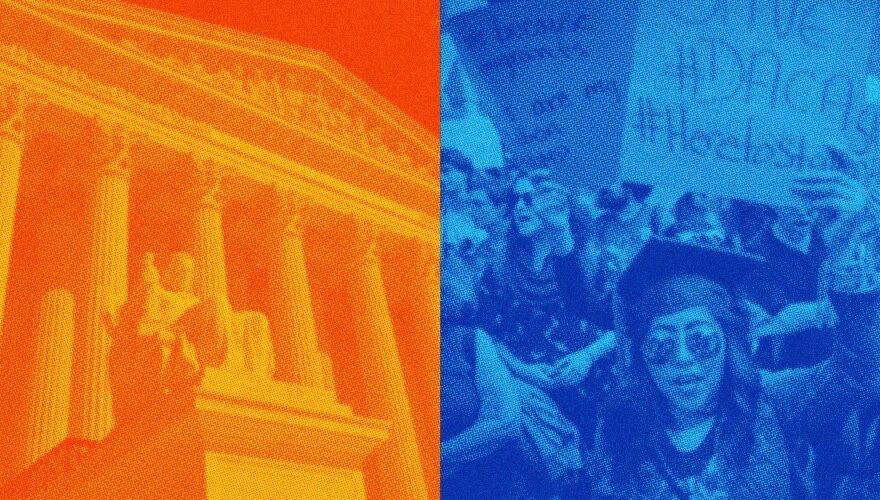
Hundreds of thousands of individuals who are eligible for the Deferred Action for Childhood Arrivals (DACA) program have been unable to benefit from its protections and opportunities. DACA, which has facilitated access to better jobs, education, and protection against deportation for young immigrants, celebrated its 11th anniversary with an uncertain future. The program has been embroiled in a six-year legal battle initiated by the Trump administration and Republican-led states aiming to terminate it entirely.
In 2021, a federal judge in Texas ruled to maintain DACA for current recipients but prevented new applicants from applying. As a result, approximately 400,000 individuals who would have qualified for the program for the first time have been unable to access its benefits, according to an analysis by FWD.us, a bipartisan organization advocating for immigration reform. Meanwhile, around 580,000 current recipients have been able to renew their DACA status every two years.
Catherine Lee, the national communications manager at United We Dream, the largest immigrant youth-led organization in the United States, emphasized, “This limbo of DACA not only impacts those who currently have DACA, but those who qualify, those who were in line trying to get their DACA”.
The DACA program, established during the Obama administration, has provided an opportunity for young immigrants, often referred to as Dreamers, who were brought to the United States as children without legal status. It allows them to work and study without the fear of deportation. However, approximately 400,000 individuals, including Aurora Lozano Chavez and Julian Cornejo, have been unable to benefit from DACA.
Lozano Chavez and Cornejo are among the nearly 93,000 first-time applicants who have been in a state of uncertainty for the past two years. They had completed the necessary paperwork and paid the required $495 fee to apply for DACA shortly before the program was closed for new applicants by the federal judge in Texas. Unless the ruling is reversed, these individuals will not receive the DACA approval letters they have been eagerly awaiting, effectively halting the processing of their first-time applications.
Lozano Chavez, 24, from San Antonio, says “I was very far ahead into the process”. She even visited the Citizenship and Immigration Services office to complete her biometrics, one of the final steps in the application procedure where applicants’ photos and fingerprints are taken. However, after waiting for a month, she discovered through social media that DACA had been closed for first-time applicants like herself, and her approval letter never arrived.
“That was unfortunate,” she remembered. Lozano Chavez expressed she feels “like I’ve missed out on many things” while she waits to see if DACA will ever reopen for new applicants.
She observed, “Many of my friends and family members who have had DACA, they already finished school, they’ve received their bachelor’s, they’ve had promotions at their jobs, they’re able to help out their family financially. Unfortunately, “With this whole DACA ordeal, it’s been kind of hard to be able to help my family financially and go back to school.”
Lozano Chavez’s family faces additional hardships, with her sister battling leukemia and her mother having a thyroid condition. She wishes, “It’s just really difficult on our part, because I’m 24 years old, I’m physically able to work, but unfortunately, I can’t work due to my status”. At this age, she had hoped to have the ability to work and contribute to society.
Cornejo, 23, from Miami, submitted his DACA application just four months before the freeze on first-time applications. His plans included enrolling in college, pursuing a career in the healthcare field, and obtaining a driver’s license once his application was approved. Despite more than two years passing, Cornejo remains determined to hold onto his aspirations.
“It can be frustrating at times,” he expressed. “But I still want to be able to study in the future and have more doors open up, because where I’m standing right now, everything is very limited to me.”
Lee noted that the majority of individuals excluded from DACA are in their late teens or early twenties and are eager to kick-start their lives. “These younger people who are graduating high school, some are even graduating community college or receiving a bachelor’s degree. They’re all unsure of what their next step is, or could be, because they don’t have access to a work permit”. “Additionally, DACA provides protections from deportation. That is a constant threat and a fear that these individuals are living with, as they don’t have any certainty of protections in this country.”
The movement advocating for the rights of Dreamers did not begin with the establishment of DACA 11 years ago. The Dream Act was introduced in Congress in the early 2000s with the goal of providing legal status and a path to citizenship for over 1 million undocumented children and young people. The movement gained strength over the years as Dreamers fought for the passage of the Dream Act. When Congress failed to act, President Barack Obama used executive power to create DACA in 2012.
Recently, attorneys representing DACA recipients and the Republican-led states seeking to terminate DACA returned to court to debate a Biden administration rule that aimed to make the program a federal regulation to enhance its chances of surviving legal challenges. A federal judge in Texas is expected to make a decision regarding the legality of the Biden rule later this year.
Lee emphasized “It’s important that we do protect DACA and what it does provide in the moment, but it’s also so important that we expand on what we have, so that ultimately there’s a pathway to citizenship for all immigrants.” Lozano Chavez, despite facing greater obstacles without DACA, obtained an associate degree a few years ago and plans to return to school in the fall to study child psychology at Texas A&M University-San Antonio. She believes, “We deserve more than just DACA”. Further she said, “We’ve been waiting years and years. We deserve a pathway to citizenship.”




